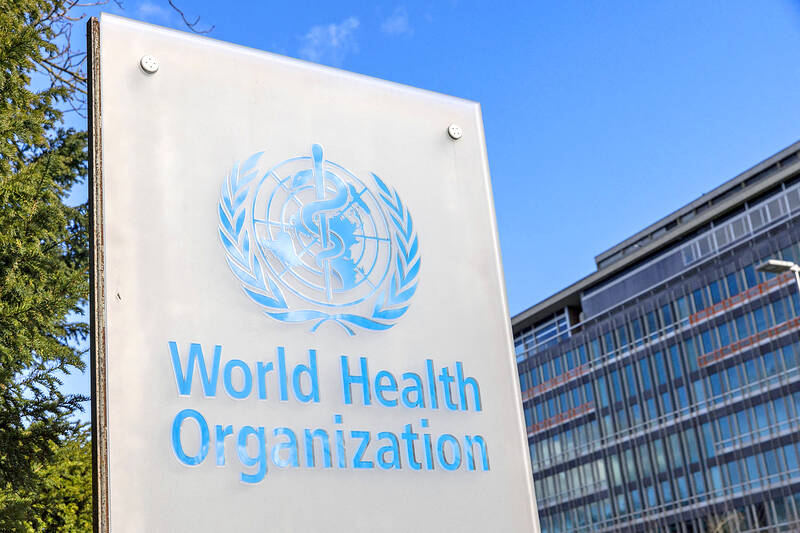The UN has contradicted its charter and infringed on freedom of the press by asking two Taiwanese correspondents covering the World Health Assembly (WHA) in Geneva, Switzerland, to present a Chinese passport when applying for interview permits, the Association of Taiwan Journalists said yesterday.
With the 77th WHA beginning on Saturday, the Central News Agency’s Brussels correspondent Tien Si-ru (田習如) and Paris correspondent Judy Tseng (曾婷瑄) followed the same procedures as they did last year to apply for interview permits at the UN office in Geneva, the association said.
As the online application form does not list Taiwan or the Republic of China under the options for nationality, Tien and Tseng chose Thailand and Tuvalu respectively, and wrote in the comment section that they are from Taiwan (Republic of China), the association said.

Photo: Reuters
Last year, the two journalists’ interview permit applications were approved ahead of the WHA, but UN staff refused to issue them when Tien and Tseng went to collect them at the UN office in Geneva, saying that they were under pressure from China, the association said, citing Tien.
This year, the two received replies from the media credential review committee on May 9 and May 10, asking them to provide “an official Chinese passport that complies with UN policies and guidance for the UN General Assembly resolutions,” it said.
Tien said that she responded by sending a copy of her Taiwanese passport and other supporting documents, and has not heard from the committee since, it said.
“The UN knows very well the relations between Taiwan and China, but it still insisted that the two journalists present Chinese passports that they could not possibly have. This is the same as rejecting requests from Taiwanese news media to cover the WHA meeting,” the association said.
This unreasonable request contradicts the purpose of the UN stated in Article 1 of the UN Charter, which states that it was established to promote and encourage “respect for human rights and for fundamental freedoms for all without distinction as to race, sex, language or religion,” the association said, adding that the UN was infringing on freedom of the press, freedom of speech and other universal values.
“We call on the UN to stop being interfered with by China and issue formal interview permits to journalists affiliated with Taiwanese media to facilitate reporting on important international conferences such as the World Health Assembly, achieve the purpose of news dissemination, ensure the full flow of information and satisfy the public’s right to know,” the association said.
The International Federation of Journalists also issued a statement in support of the association.
“Events like the World Health Assembly hold significant importance to people in all countries, and it is the responsibility of the UN and other presiding authorities to ensure that the media can conduct its duties without interference from special interests,” the federation said. “The UN and its affiliate organizations must fulfill its commitments to press freedom.”

MAKING WAVES: China’s maritime militia could become a nontraditional threat in war, clogging up shipping lanes to prevent US or Japanese intervention, a report said About 1,900 Chinese ships flying flags of convenience and fishing vessels that participated in China’s military exercises around Taiwan last month and in January have been listed for monitoring, Coast Guard Administration (CGA) Deputy Director-General Hsieh Ching-chin (謝慶欽) said yesterday. Following amendments to the Commercial Port Act (商港法) and the Law of Ships (船舶法) last month, the CGA can designate possible berthing areas or deny ports of call for vessels suspected of loitering around areas where undersea cables can be accessed, Oceans Affairs Council Minister Kuan Bi-ling (管碧玲) said. The list of suspected ships, originally 300, had risen to about 1,900 as

Japan’s strategic alliance with the US would collapse if Tokyo were to turn away from a conflict in Taiwan, Japanese Prime Minister Sanae Takaichi said yesterday, but distanced herself from previous comments that suggested a possible military response in such an event. Takaichi expressed her latest views on a nationally broadcast TV program late on Monday, where an opposition party leader criticized her for igniting tensions with China with the earlier remarks. Ties between Japan and China have sunk to the worst level in years after Takaichi said in November that a hypothetical Chinese attack on Taiwan could bring about a Japanese

Right-wing political scientist Laura Fernandez on Sunday won Costa Rica’s presidential election by a landslide, after promising to crack down on rising violence linked to the cocaine trade. Fernandez’s nearest rival, economist Alvaro Ramos, conceded defeat as results showed the ruling party far exceeding the threshold of 40 percent needed to avoid a runoff. With 94 percent of polling stations counted, the political heir of outgoing Costa Rican President Rodrigo Chaves had captured 48.3 percent of the vote compared with Ramos’ 33.4 percent, the Supreme Electoral Tribunal said. As soon as the first results were announced, members of Fernandez’s Sovereign People’s Party

MORE RESPONSIBILITY: Draftees would be expected to fight alongside professional soldiers, likely requiring the transformation of some training brigades into combat units The armed forces are to start incorporating new conscripts into combined arms brigades this year to enhance combat readiness, the Executive Yuan’s latest policy report said. The new policy would affect Taiwanese men entering the military for their compulsory service, which was extended to one year under reforms by then-president Tsai Ing-wen (蔡英文) in 2022. The conscripts would be trained to operate machine guns, uncrewed aerial vehicles, anti-tank guided missile launchers and Stinger air defense systems, the report said, adding that the basic training would be lengthened to eight weeks. After basic training, conscripts would be sorted into infantry battalions that would take